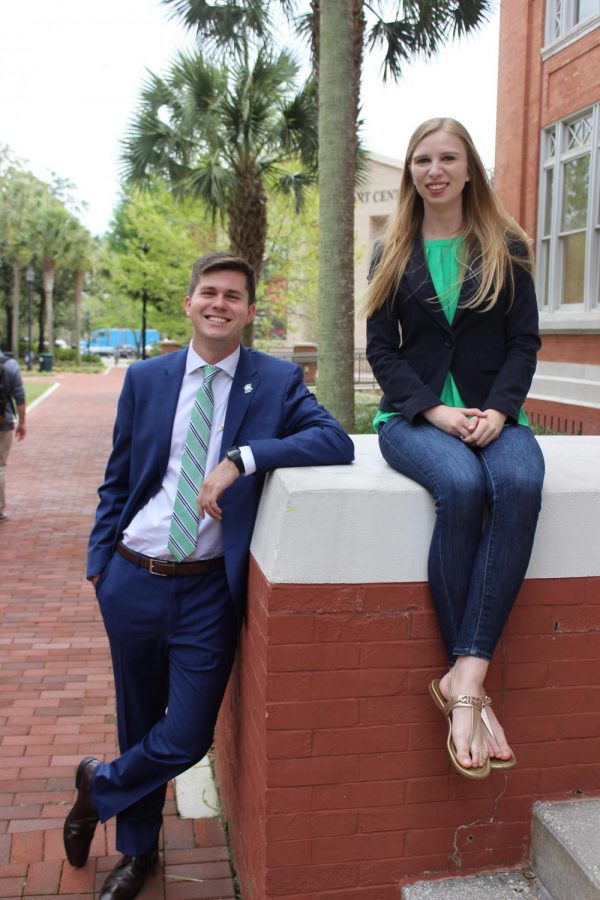An SGA election is happening soon.
We sat down with George Alderman and Hannah Weary to get an idea of what exactly they’re running for.
George Alderman and Hannah Weary, candidates for SGA President and Vice President for the 2019-2010 academic year.
April 14, 2019
A Student Government Association (SGA) election should have been held last week. For reasons being kept confidential, it was instead postponed to this upcoming Wednesday, April 17.
In order to prepare you as you head to the polls, I sat down last week with one of the candidate teams in order to talk about their platform and plans if they secure the presidency and vice presidency for this fall.
George Alderman is a sophomore political science major who is considering adding philosophy and history minors. He began his SGA career on the Committee for Academic Affairs, and is now in the Committee for Diversity and Inclusion. He has a chihuahua named Hamilton, Hammy for short.
Hannah Weary is a sophomore triple major in political science, economics, and international relations considering adding yet another major in global development. She is currently the Chair of Campus Life and has four lovely cats. One smacks into walls. This is okay.
It’s lovely outside, but our meeting is in the CUB, at that table people call the octopus for reasons far beyond me. If I squint, I can see something like the sun shining through the windows by the Hollis Center. George is there earlier than I am, already seated and waiting, and we discuss how truly awful April is, academically speaking, while waiting for Hannah to arrive. After some brief introductions–I don’t know Hannah very well, as I have become a social hermit in my old age–we jump right in.
Their choice to run together was largely a matter of happenstance, but their reasons for running mesh well and they believe they make a good team.
“[Stetson] has given me so much,” George tells me, smiling, “I don’t think I would, like, be able to be as prosperous anywhere else. This community has really given so much to me over the past two years, I want to give back to it any way that I can.”
Hannah agrees, adding, “During my time as [Chair of] Campus Life, I have experienced a lot of different communities and a lot of people feel as if they are not included within, um, the university’s processes and they would like to have a greater voice.” Although her current role already carries with it some administrative power, she feels strongly that “the vice-presidency is a great platform to expand upon the work I’ve already done as chair. It just gives me a really great position to advocate more for these people and to establish better relations with them.”
“A lot of people don’t realize they can come to us for help,” she tells me. Both she and George feel it is incredibly important to not only give voice to the unheard, but to inform them they even have that option.
“So uh, do you guys both want to go into politics?”
They’re both nodding before I finish the question. They both want to be career politicians, and Hannah laughs as she says it, “It doesn’t get a good reaction when I tell people that, but like, I really do.”
They are running on a platform of inclusivity, of hearing unheard voices, which led me to ask, “What exactly drove you to run on that platform, what were you seeing that wasn’t being done?”
George speaks up immediately in response, “In the last year I’ve spent on the Committee for Diversity and Inclusion, it has really opened my eyes to a lot of problems on this campus that people face, problems that I honestly had no idea existed because I didn’t experience them in my day to day life. I know that in recent years, SGA’s relationship with the MSC has not been particularly good, and in the last year it has improved. …I really want to build on that to make sure that Stetson is a place where students from whatever background can thrive.”
By inclusivity, George and Hannah are referring to far more than race, ethnicity, religion, gender, and sexuality–their intention is to give voice to every facet of the student population that is potentially underserved, including commuters, handicapped and disabled students, graduate students, music students, in addition to any other group that may feel excluded from representation by the SGA.
Something they also wish to do is begin turning around the current culture of SGA. Last summer, new stipulations were introduced requiring office hours and other time commitments that many senators weren’t ready to take on. In referring to this, Hannah emphasizes being “up-front with everybody” about these commitments in the future, “and a little more flexible about understanding that people have other obligations.”
“It is really great to have people who are super involved on campus, because they bring in a lot of perspective of organizations, …they’re a really valuable asset and we don’t want to lose them,” she nods thoughtfully.
After the stipulations were implemented, many senators ended up leaving SGA due to the increased time commitment, among other things. Speaking to that, George notes, “There is obviously something wrong, you know, when people get elected to this body then look around after a month or two and just kind of go, ‘eh, I don’t like this,’ and leave. …Some really driven people have left Senate. They felt like they could use their time better.”
In order to improve this within SGA, they plan to extend new member trainings to the whole SGA in order to ensure that everyone is on the same page, as well as making clear “what exactly people have to be at.”
Switching gears, I bring up the summer they will have to spend on campus if they are voted in. It’s customary for the president and vice president to spend the summer acquainting themselves with the campus and administration, as well as any ongoing projects, construction or otherwise, to prepare for the upcoming academic year. They both express a lot of excitement about this. “We’ll be on a first-name basis with the administrators by August,” George jokes.
Knowing that they are not running uncontested, I pose a more difficult question, “What exactly do you think you’re bring to the table that other candidates are not?”
“That’s a tough question,” George looks at Hannah, “would you like to take this one?”
Laughing nervously, she prefaces her answer, “I feel like all the other candidates do bring a lot to the table, it’s kind of weird to compare ourselves in terms of competency because I feel they are also competent. I want to speak more to our own positive attributes.”
“Oh, you don’t need to bash them,” I assure them. Almost all of the students running against them in the race are George’s fraternity brothers–he is in Lambda Chi Alpha. Hannah, also part of Greek life, is in Kappa Alpha Theta.
Hannah continues, reassured, “We’re very execution oriented, very action oriented, in a sense. We’ve already set up town halls, and we’re trying to figure out what people want, so if we are elected we can get such a good head start.”
“Give me a job, give us a job, it will happen,” adds George.
Last week, George and Hannah held a town hall in Palm Court in order to bring better, more effective, and larger exposure by holding the event in a major thoroughfare on campus. They want to hear as much from people as they can, and inform them in turn as much as possible about what Senate is up to. “Establishing a more personal relationship with people on campus would help them see that we are more of a resource for them than just a distant body that kind of deals with things that are ‘spicy,’ for lack of a better word,” Hannah explains. I offer “well-seasoned” as an alternative phrase. She sticks with spicy.
A huge step in the right direction, according to her, has been reaching out to organizations to immerse in their communities, as well as “having them continue to reach out to us when they need assistance, so that it’s reciprocal, so they can understand that we’re dependable.”
Their plan for the future is also to start a livestream or a collaborative effort with WHAT Radio in order to give students unable to attend Senate meetings the chance to understand what’s going on. The SGA Highlights in each issue of The Reporter, George notes, are also incredibly helpful in getting word out to the student body in an accessible and understandable way. “This needs to continue, whether it’s you guys doing it, or whether SGA takes it upon themselves to do so.”
After thirty-nine minutes and twenty-nine and a half seconds of good and wholesome conversation, I ask them, “Have I forgotten to ask you guys anything?” Then catch myself, “Oh. Yes, I did.”
“When I heard you guys were running on a platform of diversity and inclusion, I wondered, would you consider yourselves diverse? …I think this could be an issue that could come up, I mean, you are a white man and a white woman.”
They make several sounds of acknowledgment throughout my rambling question, but Hannah hesitates for a moment before jumping in.
“I’ve thought about this a lot. As part of the Bonner program, something that we teach is that when you go into a space that you may not be a part of, if you are not a minority, you can’t speak over these people, you can’t say what you think they want, you have to immerse yourself and listen. …I understand that I am a white woman and I do not have the same struggles that these people have, and I should base my actions and what I say off of what they feel.”
“You can’t make assumptions for people you don’t understand,” adds George.
“We are very prepared to be allies.”
I thank them for taking the question so well–I wasn’t sure about asking it, but it felt necessary in order to have the fullest idea of their campaign’s message. Now, again, I ask if I’ve forgotten anything. “Do you guys have any closing thoughts?”
“I’m really looking forward to this,” George looks over at Hannah as he responds, “I definitely want to continue to serve…I care way too much about the student body to have it any other way.”
“I feel the same way,” Hannah smiles at his response as she gives her own, “Even if I don’t get this, I want to continue to support Stetson in any way that I can.”
The SGA election is this Wednesday, April 17. Polls will be open between “eight-ish” A.M. and “five-ish” P.M. You can vote online on HatterSync, or in person at the CUB, Library, or LBC.








